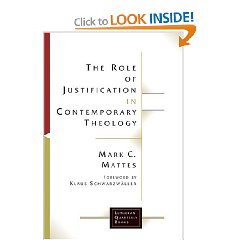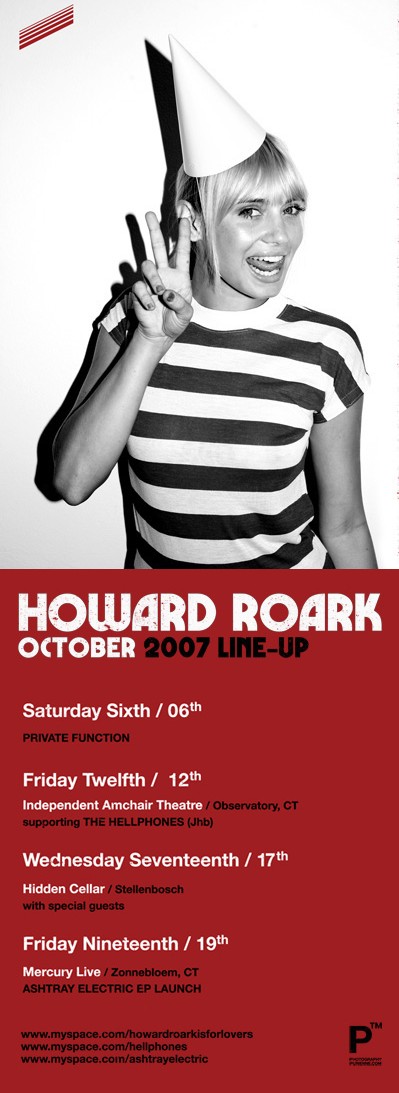
 Regular readers of our blog will, no doubt, be familiar with the deep thoughts of our favorite philosopher-hunter, David Browder. Recently, he forwarded me a discussion that he had been havingwith one of our heroes, Dr. Mark Mattes, who gave these addresses at our first-ever Mockingbird conference in 2008 and is the author of the MUST-READ The Role of Justification in Contemporary Theology. They thought that their conversation may be of interest to us here on the blog, and were they ever right. We’re hoping that this will be a regular feature here, but in good reformation-theological form, we’re just happy to receive what we’ve been given and then pass it on to you:) Enjoy!
Regular readers of our blog will, no doubt, be familiar with the deep thoughts of our favorite philosopher-hunter, David Browder. Recently, he forwarded me a discussion that he had been havingwith one of our heroes, Dr. Mark Mattes, who gave these addresses at our first-ever Mockingbird conference in 2008 and is the author of the MUST-READ The Role of Justification in Contemporary Theology. They thought that their conversation may be of interest to us here on the blog, and were they ever right. We’re hoping that this will be a regular feature here, but in good reformation-theological form, we’re just happy to receive what we’ve been given and then pass it on to you:) Enjoy!
Mark: Do we need someone to start us off? How about this? I submit that we (at least as old beings) resist grace and we use religion in some way or another to do just that. Our concern for our “potentiality” while good when the intent is to help others can and often does work as just another defense to keep us in our self-righteousness. This is a little abstract, but I’m just throwing it out there for conversation.
David: Here we go (along those lines): In the movie The Passion of Ayn Rand (at the end), one of Rand’s disillusioned old lovers asked an older Rand where love fits in her objectivist philosophy. Her response was that love consisted in reaching one’s full potential. As you know, becoming master of one’s own domain was the highest priority for her. In the very next scene, the director shows Ayn Rand’s tombstone in a graveyard. Could you give your reaction to this in terms of what it means for people living life and interacting with God?
Mark: David,”The Passion of Ayn Rand” sounds like a “must-see”movie. Love assists her to reach her full potential? Next scene: tombstone. Whetherthe director intended it or not, this to me sounds like a commentary on “the wagesof sin is death.” I would think love would be the least likely placeto look for the development or realization of self-potential, because real loveentails a letting go of oneself. I love my child really and truly only whenI love him in God and give him over to God. If every time I seek myself-development or my ego when my child is up to bat at little league,thenI’m really hurting my son. He picks up that he’s just an appendageof my ego, and that doesn’t do anything positivefor him. No doubt, manyparents do this, but isn’t this just a symptom of sin? Doesn’t one’s childreally belong to God and not to oneself? Only by letting him learn from hismistakes and triumphs do I succeed as a parent.
Love, if it is  genuine, really has very little or nothing to do with me. Unless of course I am a “love addict” and simply use another to have any sense of self or identity. But such “love addiction” is no love but only a semblance of it.A love addict doesn’t trust that God’s love is sufficient for him or her. He or she is addicted to the biochemistry of love as an antidote to pain. (And, the researchers now say that such love biochemistry is good for about a year and a half!) The addiction can never free one of such pain, however.If faith allows another (God) to be there for me (Eberhard Jüngel) and thus allows me to live outside myself in God (in the word), then similarly love too is a living outside of myself in genuine concern for my neighbor (not to control them in any way) and ultimately living outside ourselves in our love for God, lost in “wonder, love, and praise” as Charles Wesley so magnificently and somewhat mystically put it. Or as Luther put it in The Freedom of the Christian (1520), faith receives the Christ become incarnate for us in order to serve us, and such faith naturally and spontaneously issues in love in which (or even so that) we can serve others.
genuine, really has very little or nothing to do with me. Unless of course I am a “love addict” and simply use another to have any sense of self or identity. But such “love addiction” is no love but only a semblance of it.A love addict doesn’t trust that God’s love is sufficient for him or her. He or she is addicted to the biochemistry of love as an antidote to pain. (And, the researchers now say that such love biochemistry is good for about a year and a half!) The addiction can never free one of such pain, however.If faith allows another (God) to be there for me (Eberhard Jüngel) and thus allows me to live outside myself in God (in the word), then similarly love too is a living outside of myself in genuine concern for my neighbor (not to control them in any way) and ultimately living outside ourselves in our love for God, lost in “wonder, love, and praise” as Charles Wesley so magnificently and somewhat mystically put it. Or as Luther put it in The Freedom of the Christian (1520), faith receives the Christ become incarnate for us in order to serve us, and such faith naturally and spontaneously issues in love in which (or even so that) we can serve others.
If I really love, the story is no longer about me. I’m not on center stage. Instead, I’m there for someone else, and I allow someone else to be there for me. This truth, I think, can help a marriage. No doubt a teenager with a crush or in a relationship might very well feel that love is all about himself or herself, his or her feelings, due to a heightened biochemical awakening. This is all natural, and developmentally, it’s normal for the teen to be somewhat narcissistic and self-centered. 
But, genuine, mature love-akin to that of our master Jesus Christ-really is unconcerned for self. In my relationships, the narrative isn’t aboutme. It’s about us. Ultimately it’s about where God is leading us tobecome who he wants us to be-free to be and free to serve where and when that service is needed. As a mentioned at our recent conference, I’m convinced that nature as it comes from the hand of God and were it to be unsullied by original sin isgeared towards an altruism. God’s law as accusing and destroyingbrings an end to our being-curved-in-on-ourselves (which is nature for Ayn Rand butcorrupt nature for us!) so that grace might liberate this nature, and allow creation to be as God intends it. Be aware: the social sciences don’t study human nature as such, but only human nature as sullied and polluted by original sin.
David: it sounds like love (which seems like an all-encompassing idea) has two different meanings in Christianity and the world of Aristotle (Ayn Rand was a self-proclaimed Aristotelian, of course). Is there a common thread between the natural man’s potential-based emphasis and potential-based Christianity?
Mark: I find your comparison between secular Ayn Rand and many “born-again” Christians, with respect to love, insightful. I would think the common thread is me, myself, and I. For many Christians, Christ simply helps us fulfill our potential. In many respects, one could ask them: Is Jesus Christ really necessary for your salvation and life? Or is he a supplement? With respect to self and others, though, they really are on a continuum with a secular philosopher such as Rand. But the truth, as I see it, is: Love doesn’t justify. Faith does. And, when you love, it demands that you die, hardly fulfilling any kind of potential, but opening me up to where others are.
I find your comparison between secular Ayn Rand and many “born-again” Christians, with respect to love, insightful. I would think the common thread is me, myself, and I. For many Christians, Christ simply helps us fulfill our potential. In many respects, one could ask them: Is Jesus Christ really necessary for your salvation and life? Or is he a supplement? With respect to self and others, though, they really are on a continuum with a secular philosopher such as Rand. But the truth, as I see it, is: Love doesn’t justify. Faith does. And, when you love, it demands that you die, hardly fulfilling any kind of potential, but opening me up to where others are.

COMMENTS
6 responses to “Love Doesn’t Justify; Faith does: an interview with Dr. Mark Mattes”
Leave a Reply














Dear David,
This is excellent stuff. Best interview yet!
Amazing!!!! I need this.
Thanks Dave.
This is a breath of fresh air…wow.
Such a great post.
I've lurked on Mockingbird for quite a while, not sure what to make of the movie reviews, but this post brings it all into view for me once again. Thank you.
-App
The movie reviewers and everybody else are real happy you are here, App. Welcome!